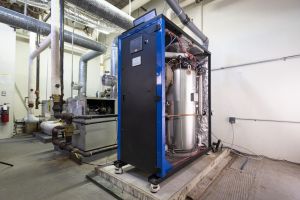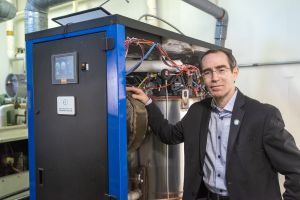![]()
Turning lost heat to energy is what sets this HVAC boiler apart
Enviro Power’s SmartWatt has been installed in residential and commercial buildings.
By John Caulfield
Enviro Power‘s SmartWatt replacement boiler efficiently converts lost heat into electricity. It is suitable for both new and existing buildings.
Who says HVAC is staid?
Heat pumps, whose unit sales surpassed gas furnaces for the first time last year, are steadily gaining mainstream acceptance in the U.S. as environmentally friendlier all-in-one heating and cooling alternatives that run on electricity.
Another kind of heating system is trying to make inroads, too. Last year, Connecticut-based Enviro Power Technologies, in partnership with the national manufacturer Burnham Holdings, began production on SmartWatt, a first-of-its kind replacement boiler with a mini power plant that converts lost heat into electricity.
SmartWatt in December achieved Intertek ETL certification, which indicates compliance with North American safety standards. Dan Nadav, Enviro Power’s CEO, expects his company will sell between 100 and 200 units in 2023, and at least 500 units in 2024.
Among the AEC companies that have endorsed SmartWatt is the engineering firm Syska Hennessy. “We see growing pressure on our customers’ end to lower [their] carbon footprint and cost of energy,” says Robert Ioanna, PE, LEED AP, Executive Principal at Syska Hennessy Group. “SmartWatt provides a decarbonizing and energy saving solution designed as a drop-in replacement that can be implemented today and has a two- to three-year ROI before incentives are applied.”
Installation that fits the infrastructure
Nadav has two decades of experience working with what he calls distributed generation technologies. His partner, Michael Cocuzza, who is Enviro Power’s’ Chief Technology Officer and President, has 10-plus years’ experience in mechanical design and the patenting of energy solutions.
Enviro Power estimates that 10 million boilers are replaced each year in Europe and North America. But many existing buildings are still operating on antiquated heating systems. “We needed to act now,” says Nadav, to standardize its product around a building’s existing infrastructure and the replacement market.
Enviro Power developed SmartWatt’s mini power plant with Windings, Inc., a Minnesota-based maker of motors and generators. The company currently offers two boilers: a 5-kilowatt 150,000 BTUh unit that’s suitable for single-family homes; and a 6-kW 300,000 BTUh unit for multifamily and commercial buildings. The larger unit’s price starts at around $20,000 to install, and would begin returning that investment in the boiler’s first year of operation, says Nadav, figuring the cost of a kilowatt hour at 25 cents and the building operating between 4,000 and 7,000 hours per year.
Nadav calculates that in a sophisticated energy grid market like New England, the installation of 1,000 SmartWatt boilers would have the potential for saving 30,000 tons of CO2, or the equivalent of the carbon footprint of 1,700 homes.
Dan Nadav, Enviro Power‘s CEO, has been involved in distributed generation for two decades.
Focusing growth on the Northeast first
Freedom Property is a real estate property manager based in Southington, Conn., that specializes small-to-midsize multifamily redevelopments. It currently manages 160 apartment units, a number that is on track to increase to between 200 and 225 by the end of this year, says Luke Florian, who started the company in 2014.
Last October, Freedom Property installed its first SmartWatt boiler, the 6-kW model, at a cost of $24,000. The building was installed in the former Iron Horse Inn that Florian had converted into 25 boutique apartments. The boiler is providing domestic hot water, and the mini plant is powering the lights for the building’s corridor and parking lot.
(Enviro Power estimates that a 6-kW unit has the capacity to provide domestic hot water, with the appropriate storage tank, for up to 50 apartments before a second unit would be needed. If the SmartWatt unit is also providing space heating, it could handle up to eight apartments.)
Florian—who went to high school with Cocuzza and had stayed in touch—told BD+C early this month that he was planning to replace an existing boiler with a SmartWatt unit in another building in East Hartford, Conn., with 21 apartments. “It’s a great technology.” And while he won’t know the savings definitively until four or five billing cycles, “it’s trending positively.”
Last fall, Wesleyan University in Middletown, Conn., installed a SmartWatt boiler in its Butterfield student dormitory complex. The system was initially tested at the 56,000-sf Butterfield C dorm, and now provides hot water and “free” electricity to the three-story, 197-student residence and dining hall.
Sen. Chris Murphy (D-Conn.) recently praised the SmartWatt technology, and named Enviro Power a 2022 Innovator. “Working with Enviro Power checks every box—engaging with a high-quality local manufacturer, advancing new technology, improving energy efficiency in University buildings, and reducing our energy costs.”
Ioanna of Syska Hennessy says now that SmartWatt is certified and under production, his firm can start introducing the boiler to its customers.
Nadav says that his company’s growth strategy would focus initially on the Northeast market, and then it would start bringing out larger units: a 400,000-BTUIh model this year, and a 20-kW, 1 million BTUh model in 2024 for hotels and hospitals.
Ultimately, Nadav says that Enviro Power wants to offer a cogeneration system that provides backup power.




